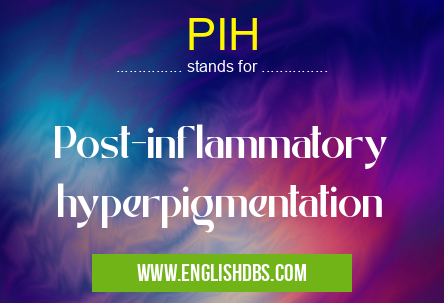What does PIH mean in DISEASES
Post-inflammatory hyperpigmentation (PIH), also known as post-inflammatory hypermelanosis, is a common skin condition that occurs after inflammation or injury to the skin. It is characterized by the development of dark, discolored patches on the skin that are typically darker than the surrounding skin tone. PIH can affect people of all ages and skin types, but it is more common in those with darker skin tones.

PIH meaning in Diseases in Medical
PIH mostly used in an acronym Diseases in Category Medical that means Post-inflammatory hyperpigmentation
Shorthand: PIH,
Full Form: Post-inflammatory hyperpigmentation
For more information of "Post-inflammatory hyperpigmentation", see the section below.
Causes of PIH
PIH is caused by an increase in the production of melanin, the pigment that gives skin its color. This increase in melanin production can be triggered by inflammation or injury to the skin, such as:
- Acne
- Eczema
- Psoriasis
- Sunburn
- Trauma
Symptoms of PIH
The most common symptom of PIH is the development of dark, discolored patches on the skin. These patches can range in size from small spots to large areas of the skin. PIH can occur on any part of the body but is most commonly found on the face, neck, chest, and back.
Treatment of PIH
There are a variety of treatments available for PIH, including:
- Topical medications: These medications are applied directly to the skin and contain ingredients that can help to lighten the dark patches.
- Chemical peels: These treatments involve applying a chemical solution to the skin to remove the top layer of skin and reveal the lighter skin underneath.
- Laser therapy: This treatment uses a laser to target and destroy the melanin-producing cells in the skin.
- Microneedling: This treatment involves using tiny needles to create micro-injuries in the skin, which stimulates the production of collagen and elastin and can help to improve the appearance of PIH.
Prevention of PIH
There are a few things you can do to help prevent PIH, including:
- Protecting your skin from the sun: Sun exposure can trigger the production of melanin, so it is important to protect your skin from the sun by wearing sunscreen and seeking shade.
- Treating skin inflammation promptly: If you have a skin condition that causes inflammation, it is important to treat it promptly to reduce the risk of developing PIH.
- Avoiding picking or scratching at your skin: Picking or scratching at your skin can damage the skin and lead to the development of PIH.
Essential Questions and Answers on Post-inflammatory hyperpigmentation in "MEDICAL»DISEASES"
What is post-inflammatory hyperpigmentation (PIH)?
PIH is a common skin condition that causes darkening of the skin after inflammation or injury. It occurs when the skin produces excess melanin, the pigment that gives skin its color. This can happen after acne, eczema, psoriasis, or other skin injuries.
What causes PIH?
PIH is caused by an increase in melanin production in the skin. This can happen after inflammation or injury to the skin, such as from acne, eczema, psoriasis, or sun exposure.
What are the symptoms of PIH?
PIH appears as dark patches or spots on the skin. These patches can be brown, black, or gray. They are often found on the face, neck, chest, or back.
How is PIH treated?
There are a number of treatments for PIH, including:
- Topical creams or gels that contain hydroquinone, kojic acid, or arbutin
- Chemical peels
- Laser therapy
- Microneedling
How can I prevent PIH?
There are a few things you can do to help prevent PIH, including:
- Avoiding sun exposure
- Using sunscreen
- Treating acne and other skin conditions promptly
- Using gentle skin care products
Final Words: PIH is a common skin condition that can be caused by a variety of factors. While there is no cure for PIH, there are a number of treatments available to help improve its appearance. If you are concerned about PIH, it is important to talk to your doctor about the best treatment options for you.
PIH also stands for: |
|
| All stands for PIH |
